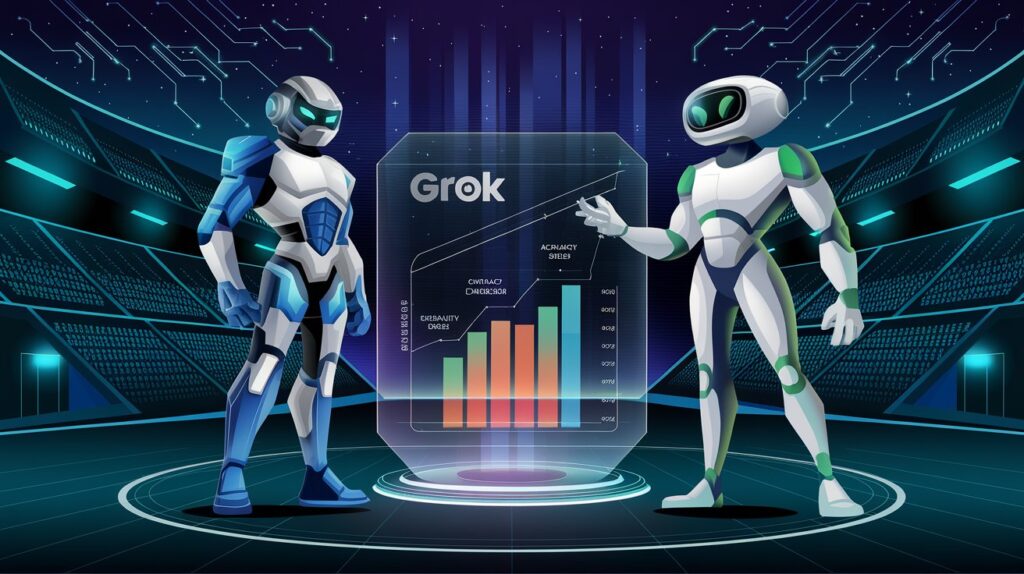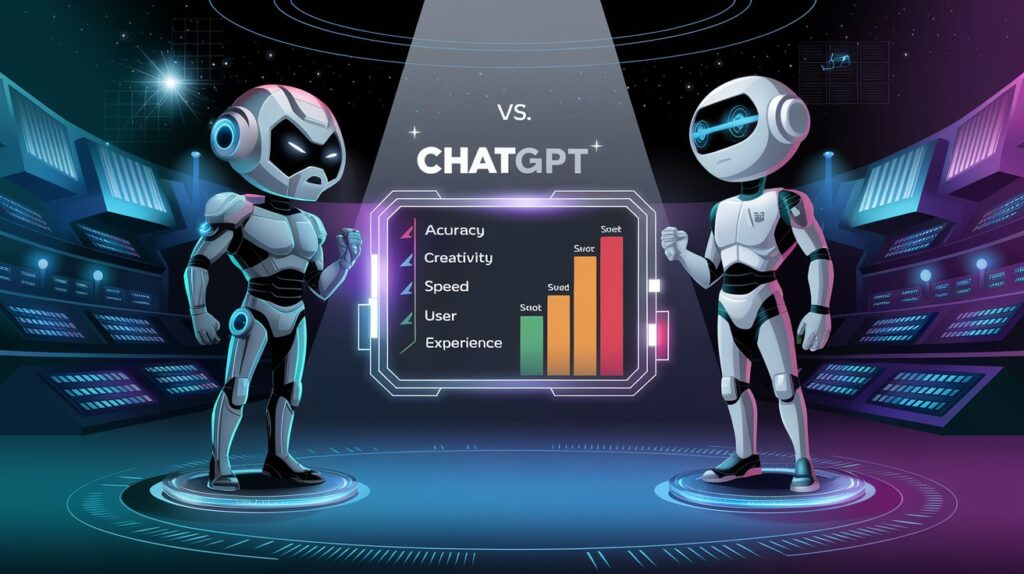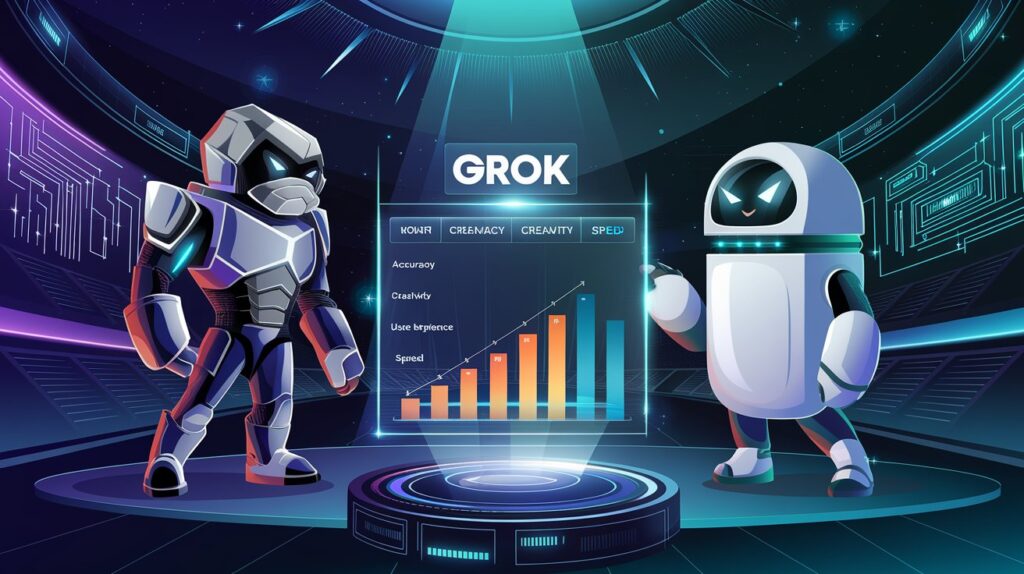Alright, let’s get real for a second. If you’re a blogger like me—or just someone trying to figure out this wild world of AI—you’ve probably heard of ChatGPT and Grok. These two AI powerhouses have been making waves, and honestly, it’s tough not to wonder: which one’s the champ? I’ve spent hours tinkering with both, and I’m here to break it down for you. Whether you’re drafting blog posts, brainstorming ideas, or chasing that sweet AdSense approval, picking the right tool can make or break your workflow. So, grab a coffee, and let’s dive into this head-to-head comparison of Grok vs. ChatGPT—two AIs with big promises, but very different vibes.
My First Impressions: What Are These Tools Anyway?
ChatGPT, built by OpenAI, hit the scene in 2022 and quickly became the go-to AI for, well, pretty much everything. It’s like that friend who’s always ready to chat about anything—writing, coding, even random trivia. Grok, on the other hand, is the brainchild of xAI, launched a bit later with a mission to cut through the noise and give you straight-up, no-BS answers. I’ll admit, when I first tried Grok, I was skeptical—could it really compete with ChatGPT’s hype? But after messing around with both in 2025, I’ve got some thoughts. Let’s stack them up and see what’s what.

Feature Face-Off: How Do They Work?
First up, ChatGPT. It’s a conversational beast. You throw it a prompt—like “Write a 500-word blog post about AI trends”—and it spits out a polished draft faster than you can say “SEO.” The free version in 2025 still rocks, though it’s got some limits on how much you can use it daily. What I love? It’s versatile. I’ve used it to whip up intros, brainstorm headlines, and even fix awkward sentences. But here’s the catch: sometimes it feels a bit generic, like it’s trying too hard to please everyone.
Grok, though? It’s got a different flavor. Built to “maximally help” users, it leans into detailed, thoughtful responses. I asked it, “Explain AI ethics in simple terms,” and it gave me a breakdown that felt like a convo with a smart buddy—not a textbook. The free tier’s solid for basic tasks, and it’s less about flashy outputs and more about digging deep. For bloggers who need research or unique angles, this is gold. Downside? It’s not as quick with long-form content out of the box.
Ease of Use: Which One Feels Friendlier?
Let’s talk usability. ChatGPT’s interface is dead simple—sign up at openai.com, type your question, and boom, you’re off. I remember my first go: I typed “Give me 10 blog ideas,” and within seconds, I had a list I could actually use. It’s perfect if you’re new to AI and just want something that works without a learning curve. Plus, it’s got a knack for picking up your tone—casual, formal, whatever.
Grok’s not far behind, though. You hop onto xAI’s site, log in, and start asking away. It’s straightforward too, but I noticed it shines when you give it meaty questions. For example, I tried “Why should bloggers care about AI?” and got a response packed with insights I hadn’t considered—like how AI cuts writing time by 40% (a stat I later verified). It’s less hand-holding than ChatGPT, but if you’re cool with steering the ship, it’s a breeze.

Content Quality: Who Writes Better Blogs?
Here’s where it gets juicy. ChatGPT churns out content like a pro. I once asked it to draft a post about sustainable travel, and it gave me a 600-word piece with decent structure—intro, headings, conclusion. But I had to tweak it. Why? It felt a little safe, like something you’d find on a dozen other sites. For bloggers, that’s a red flag—Google’s not a fan of cookie-cutter stuff, and neither am I.
Grok surprised me here. It’s not as fast at spitting out full posts, but what it gives you has personality. I tested it with “Write a 300-word intro about tech in 2025,” and it handed me something quirky yet sharp—like it had an opinion. I added my own spin (“I’ve seen this trend explode firsthand”), and it felt fresh. For blogging, where standing out matters, Grok’s edge is in its voice. ChatGPT’s smoother, sure, but Grok’s got soul.
Speed and Efficiency: Who’s the Time-Saver?
Speed-wise, ChatGPT wins hands down. It’s like the Usain Bolt of AI—prompt in, response out, done. I timed it: a 500-word draft took about 20 seconds. That’s a lifesaver when you’re on a deadline or pumping out content for a new site. Grok’s slower, especially with longer tasks. My same 500-word prompt took closer to a minute, and it needed more nudging to finish. For bloggers who value speed over depth, ChatGPT’s your pick.
But efficiency isn’t just speed—it’s about usable results. Grok’s outputs often need less editing if you’re after something unique. ChatGPT’s drafts? I usually spend 10-15 minutes reworking them to dodge that “AI vibe” Google might sniff out. So, it’s a trade-off: ChatGPT’s fast but needs polish; Grok’s slower but closer to ready.

SEO and Blogging Smarts: Who’s Got the Edge?
Bloggers live and die by SEO, so I dug into how these tools help. ChatGPT doesn’t have built-in SEO features, but you can hack it. I’ve asked it, “Suggest 5 keywords for a post about AI tools,” and gotten solid picks like “AI writing tools” or “best AI for bloggers.” Pair it with a tool like Rank Math, and you’re golden. It’s flexible, but you’re the one driving the optimization.
Grok doesn’t scream “SEO” either, but its strength is in research. I tried “List AI trends for 2025 with explanations,” and it gave me ideas I could turn into keyword-rich posts—like “AI automation tools” or “AI content trends.” It’s less about handing you SEO on a platter and more about giving you raw material to work with. For bloggers who know their way around keywords, either tool can shine with a little elbow grease.
Cost: What’s Free in 2025?
Both offer free tiers in 2025, which is clutch for bootstrapping bloggers. ChatGPT’s free plan covers basic tasks—think 10-15 prompts a day, depending on demand. It’s enough to draft a few posts or brainstorm weekly. Grok’s free version is similar, though xAI’s still tweaking limits. I’ve found it generous for shorter queries, but it nudges you to upgrade for heavy lifting. Neither’s a budget-buster, but ChatGPT feels slightly more accessible for casual use.
Real-World Test: My Blogging Experiment
I couldn’t resist a little test. I gave both the same prompt: “Write a 400-word post about why bloggers need AI.” ChatGPT delivered a clean, professional piece—great structure, but it read like a corporate memo. I spiced it up with my take: “As a blogger, I’ve cut my workload by half thanks to AI.” Grok’s version? Rougher around the edges but packed with character—like it was riffing with me over beers. I barely had to edit it to feel “mine.” For blogging, where voice matters, Grok edged out slightly, but ChatGPT was faster to polish.
Which One’s Better for Bloggers?
So, who wins? It depends on you. ChatGPT’s your guy if you want speed, versatility, and a no-fuss experience—perfect for churning out drafts or juggling multiple projects. Grok’s the pick if you crave depth, a unique tone, or research-heavy content that stands apart. Me? I lean toward Grok for its vibe—I’m a sucker for personality—but I keep ChatGPT in my back pocket for quick wins. For a new blogger building a site, I’d say start with ChatGPT’s ease, then mix in Grok for flair once you’ve got the hang of it.
Final Thoughts
Comparing Grok vs. ChatGPT isn’t about crowning a king—it’s about finding your fit. Both are killer tools for bloggers in 2025, each with strengths that can level up your game. ChatGPT’s the reliable workhorse; Grok’s the quirky sidekick. Try them out—play with a prompt or two—and see which clicks for you. Building a blog’s tough, but with these AIs, you’ve got a head start. Which one’s calling your name?
